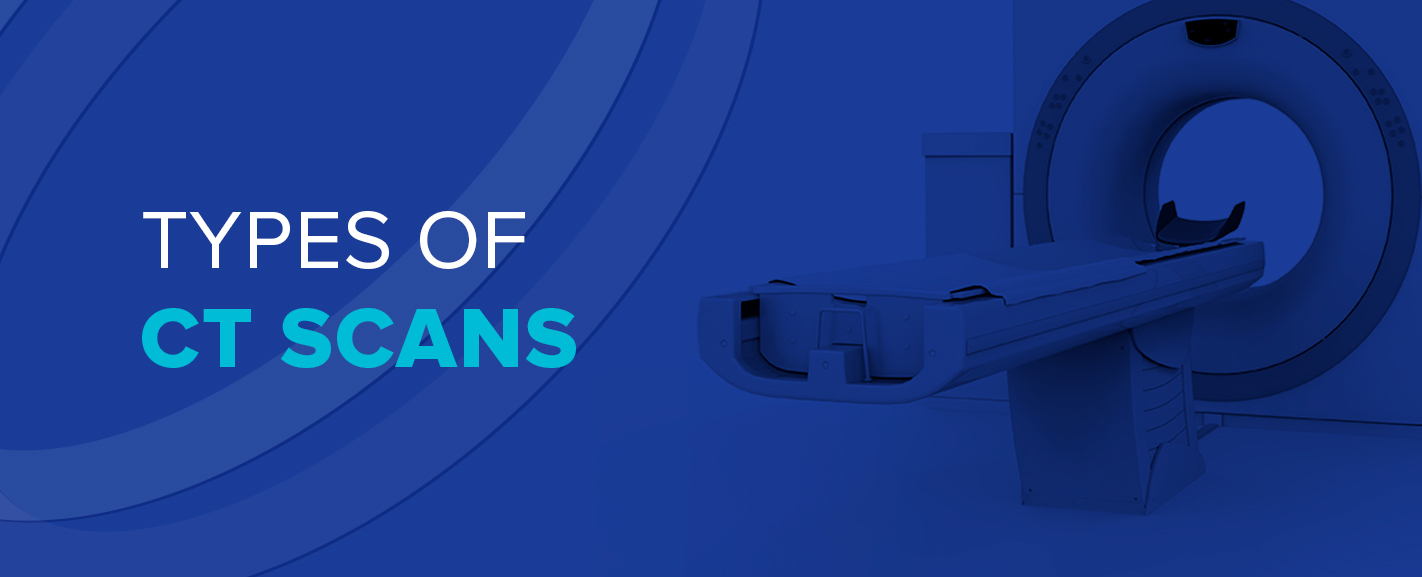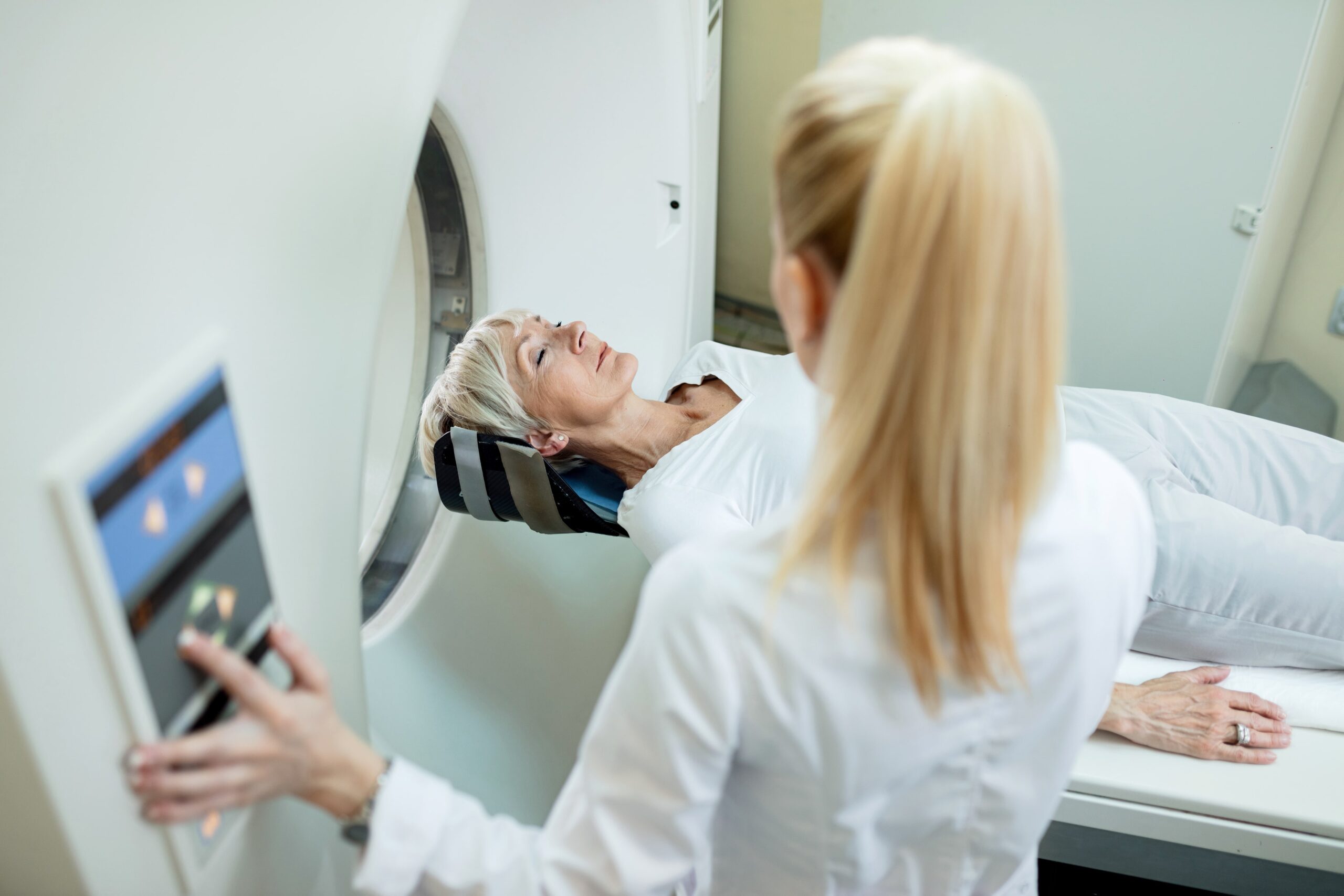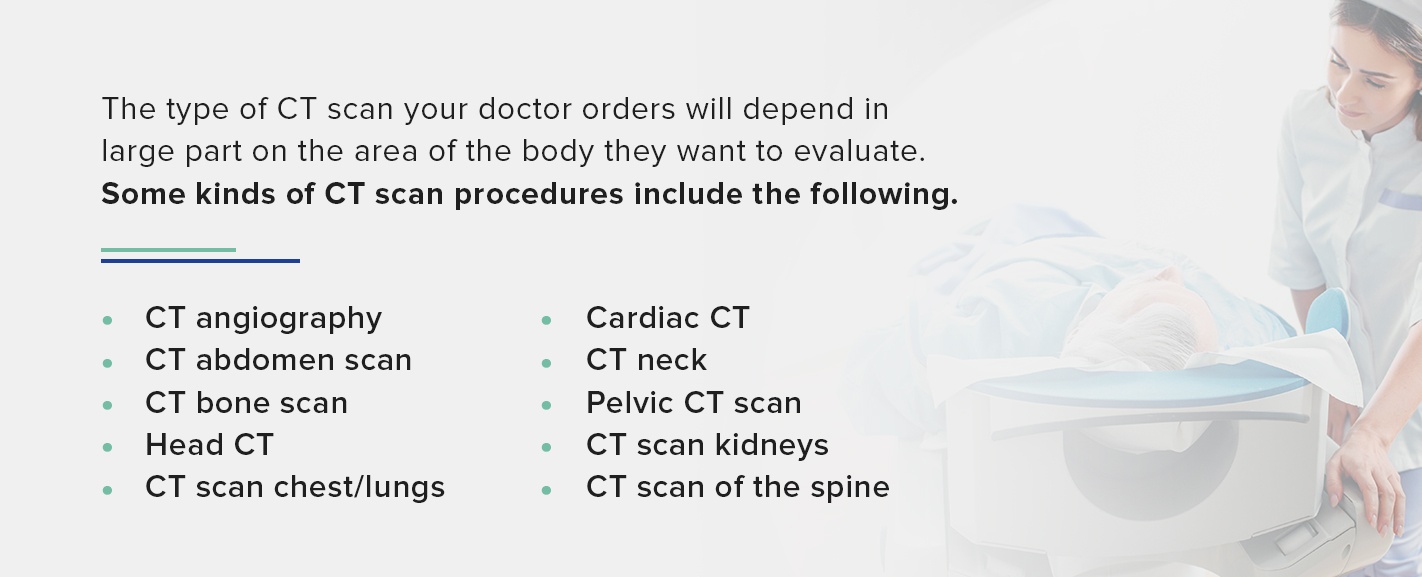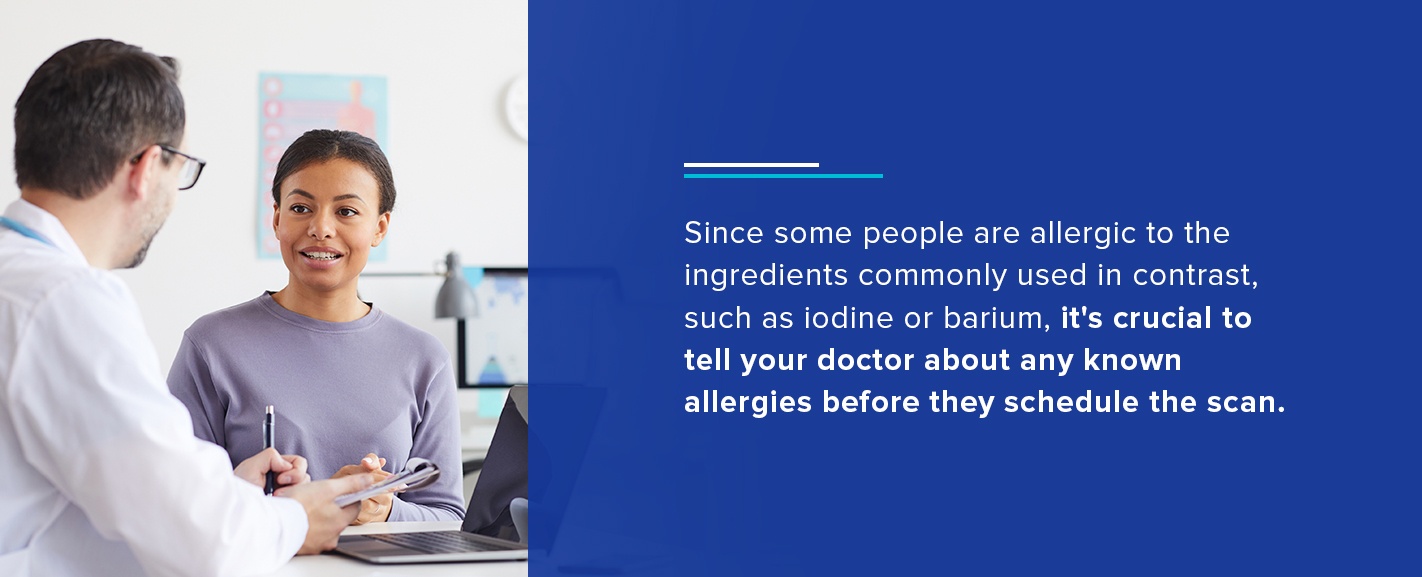Types of CT Scans

When your doctor wants to get a better look at what is going on inside your body, they will most likely order imaging. Several different technologies exist to diagnose conditions. Depending on the type of imaging and the area of the body, the method used to capture a picture of the inside of the body might be magnetic waves, ionizing radiation, sound waves or radiotracers. Computed tomography (CT) scans use ionizing radiation, or x-rays, to get an image of the inside of the body. Your doctor might order a CT scan if they believe you have a broken bone or if they are trying to detect tumors or other signs of illness in the body.
Learn more about the different kinds of CT scans and what you can expect when you get one.
Intro to CT Scans: What Are They?
Is a CT Scan the Same as a CAT Scan?
CT scans, sometimes called CAT scans, are diagnostic imaging procedures. Your doctor will ask you to get a CT scan if they want to get a better idea of what’s happening inside your body. CT scans use the same imaging method as x-rays — ionizing radiation — but can capture images x-rays cannot. An x-ray captures a two-dimensional picture of a structure inside the body, such as a person’s bones. A CT scan produces a three-dimensional image. The images captured by a CT scan provide a doctor with a clearer view of a patient’s inner organs, blood vessels and soft tissues than a traditional x-ray.
CT Scan Machine
During a CT scan, a patient lies on a table, which slides into a large tube. The tube contains an x-ray machine that takes photos of the inside of the body. Usually, the entire process takes about 15 minutes and is painless. The pictures taken during the scan get sent to a computer. A technologist can assemble the photos to create a 3D image to give to the doctor. It’s also possible for a physician to evaluate the images separately.
What Are the Different Kinds of CT Scans?
The type of CT scan your doctor orders will depend in large part on the area of the body they want to evaluate. Some kinds of CT scan procedures include the following.
- CT angiography: A doctor might order a CT angiography, or angiogram, if they want to assess a person’s risk of heart disease. The scan can also help doctors detect damage to the blood vessels, such as aneurysms or blockages. Before the scan, a health professional injects dye into the blood vessels to help make the flow of blood through the body more visible. A CT technologist then takes images of the blood vessels.
- CT abdomen scan: During an abdominal CT scan, a technologist will capture images of the organs of the digestive tract, such as the intestines, colon, liver, spleen and appendix. A doctor might order an abdomen scan to detect abscesses in the area, to discover internal bleeding or to identify and diagnose tumors, such as those in the colon.
- CT bone scan: While an x-ray can detect a fracture or other problem with the bones, health care professionals also sometimes use a CT scan of the bones. Since a CT scan can give more information to a doctor, they might order one if the results of a traditional x-ray are inconclusive. A CT bone scan will also provide a clearer picture of the soft tissues near the bones, such as the tendons and muscles. A CT bone scan might also help diagnose cancer in the bones.
- Head CT: A doctor might order a head CT for a patient who is experiencing unexplained headaches or dizziness. The procedure can also help diagnose brain tumors or strokes. A head CT captures images of the brain and other areas of the head, such as the sinuses. Patients with ongoing sinus issues might benefit from a head CT to determine if there is ongoing inflammation in the area.
- CT scan chest/lungs: A CT scan of the chest can provide a doctor with detailed images of a person’s lungs. Doctors might order the scan if a patient complains of having trouble breathing or of having chest pain. The images can help doctors diagnose conditions such as lung cancer, pneumonia, tuberculosis or excess fluid in the lungs.
- Cardiac CT: A cardiac CT scan also takes pictures of the chest area. However, the focus is not on the lungs, but on a person’s heart. A doctor might order a cardiac CT to detect problems with the aorta, heart valves and other arteries. In some cases, a doctor might order a cardiac CT scan to follow up on the results of a procedure, such as coronary artery bypass grafting.
- CT neck: A CT scan of the neck typically captures images of the area from the base of the skull to the top of the lungs. The scan can detect and diagnose tumors or masses in the neck, on the tongue, on the vocal cords or in the upper airway. A doctor can also detect growths or abnormalities on the thyroid gland or issues with the carotid artery using a neck CT scan.
- Pelvic CT scan: A pelvic CT will take pictures of the area inside the body between the hipbones. It can help diagnose issues with the male or female reproductive systems or to identify bladder problems, such as bladder stones or tumors.
- CT scan kidneys: A common reason for a CT scan of the kidneys is to detect and confirm the presence of kidney stones. The scan can also help identify tumors, abscesses and signs of kidney disease.
- CT scan of the spine: Spinal CT scans capture images of the bony spinal structure, the discs between the bones and the soft tissue of the spinal column. A CT scan of the spine can help a doctor assess injury to the area, diagnose herniated discs and evaluate the area before surgery. In some cases, a doctor might use a spinal CT to gauge bone loss in the area as a result of osteoporosis. A CT scan of the spine can also be an aid during a biopsy or other procedure.
CT Scan With or Without Contrast
Some types of CT scans require the use of a special chemical called contrast, which helps make soft tissue easier to see on the images. Although you might have heard contrast called a dye, it doesn’t change the color of the organs or soft tissues inside the body. Instead, it works by blocking the x-rays. Contrast looks white on the images, making the organs or other tissues stand out.
Not all types of CT scans require contrast. Your doctor will let you know if yours does before you schedule it. Since some people are allergic to the ingredients commonly used in contrast, such as iodine or barium, it’s crucial to tell your doctor about any known allergies before they schedule the scan.
There are different ways of receiving contrast before a scan. You might get it intravenously, through an injection. Your technologist might also give you something to swallow. If you are going to have contrast before a CT scan, you won’t be able to eat or drink anything starting several hours beforehand.
Schedule Your CT Scan in Denver, Colorado, Today
Health Images takes a patient-centric approach to imaging. Whether you need a CT scan with or without contrast, we’ll take the time to explain the process to you and help you feel relaxed and comfortable throughout. We have multiple facilities in and around Denver, Colorado, for your convenience. Find the location nearest you and reach out today to learn more about opening hours, appointments and what you can do to prepare for your CT scan.
Call To Schedule Your Appointment
Sources:
- https://www.envrad.com/services/ct-scans/
- https://www.envrad.com/difference-between-x-ray-ct-scan-and-mri
- https://blog.radiology.virginia.edu/different-imaging-tests-explained/
- https://medlineplus.gov/ctscans.html
- https://www.radiologyinfo.org/en/info.cfm?pg=angioct
- https://ipmcmed.com/radiology/ct-scan/types-of-ct-scan/
- https://www.hopkinsmedicine.org/health/treatment-tests-and-therapies/computed-tomography-ct-or-cat-scan-of-the-abdomen
- https://www.urmc.rochester.edu/encyclopedia/content.aspx?contenttypeid=92&contentid=P07649
- https://www.radiologyinfo.org/en/info.cfm?pg=headct
- https://www.mayoclinic.org/tests-procedures/ct-scan/about/pac-20393675
- https://stanfordhealthcare.org/medical-tests/c/ct-scan.html
- https://www.nhlbi.nih.gov/health-topics/cardiac-ct-scan
- https://www.nhlbi.nih.gov/health-topics/chest-ct-scan
- https://www.cedars-sinai.edu/Patients/Programs-and-Services/Imaging-Center/For-Physicians/Neuroradiology/CT-Neck.asp
- https://medlineplus.gov/ency/article/007362.htm#
- https://www.hopkinsmedicine.org/health/treatment-tests-and-therapies/ct-scan-of-the-kidney
- https://www.radiologyinfo.org/en/info.cfm?pg=spinect
- https://medicine.yale.edu/diagnosticradiology/patientcare/physicians/er/contrastquestions/
- https://www.radiologyinfo.org/en/info.cfm?pg=safety-contrast
- https://www.healthimages.com/locations/





